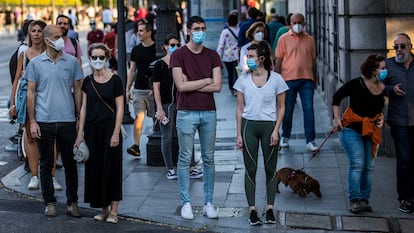Spain’s Health Ministry will make masks obligatory beyond just public transit
Also announced today is a plan to scrap timetables for exercise in municipalities with fewer than 10,000 inhabitants

The use of face masks in Spain will be obligatory beyond just on public transportation, Health Minister Salvador Illa announced on Sunday. A number of regional governments had been calling for the measure for some time now, in a bid to further control the spread of the coronavirus. Illa said today that, given the unanimous agreement of regional chiefs, an order will be published on the issue in the coming days, although he gave no further details.
This was one of the decisions that was taken today during the weekly video-conference meeting between the central government in Madrid and Spain’s regional premiers, and which has been taking place every Sunday since the coronavirus crisis took hold.
The other decision that has been announced from the meeting today is a package of measures for rural Spain. “[The rules] for municipalities of fewer than 5,000 inhabitants will be rolled out to those with fewer than 10,000,” Illa explained. While details are yet to be announced, this will involve getting rid of the current timetables during which people can talk walks or other exercise, as is currently the case for municipalities with fewer than 5,000 inhabitants. These changes will be introduced no matter which phase of Spain’s deescalation plan the area in question is currently in.
The issue of face masks has been one of the measures that has been subject to the most variations since the health crisis began
In Spain there are 7,372 municipalities with up to 10,000 inhabitants, which accounts for 90% of the total of 8,131. However, just 20.1% of the population of Spain lives in these areas, according to data from the National Statistics Institute (INE).
The Health Ministry will be the only government department that still has complete control over the regions if the Spanish prime minister, Pedro Sánchez, succeeds in securing a last extension to the state of alarm, this time for one month instead of two weeks. The state of alarm was implemented on March 14 to give the government extra powers to combat the spread of the coronavirus, and has been extended on a two-weekly basis since then.
The ministry is planning on tweaking measures according to the progress of the epidemic in the country. The data for the current situation is ever-more promising, with the lowest number of Covid-19-related deaths reported today – 87 – for two months.
Representatives from the Health Ministry have said that changes will be based on trial and error, and subject to constant alteration.
The issue of face masks has been one of the measures that has been subject to the most variations since the health crisis began. At the outset, the authorities did not recommend that they be worn by people with no symptoms, and described them as unnecessary and even counterproductive. But the European Center for Disease Protection and Control changed its criteria, and several weeks later they were made obligatory on public transport. In the next few days, as Illa announced today, this requirement will extend to public spaces.
The masks that are currently recommended for use by the public are the so-called hygienic masks, or surgical ones
Until now, their use has been “recommended” in areas where two-meter safe distances cannot be respected. It is almost certain that they will become obligatory in businesses and closed public spaces, but there are still doubts about whether they will be necessary on the street and in workplaces.
The masks that are currently recommended for use by the public are the so-called hygienic masks, or surgical ones. When used properly, they are more effective at preventing a person with the coronavirus infecting someone else, rather than avoiding being infected. At the start of the pandemic, it was thought that asymptomatic carriers of the coronavirus had little chance of transmitting it, which is why the majority of international organizations recommended they were reserved for those with signs of Covid-19.
But as time has passed, and more is known about the disease, it has become evident that people can pass on the coronavirus in the days prior to developing symptoms or even without having any symptoms at all.
English version by Simon Hunter.
Tu suscripción se está usando en otro dispositivo
¿Quieres añadir otro usuario a tu suscripción?
Si continúas leyendo en este dispositivo, no se podrá leer en el otro.
FlechaTu suscripción se está usando en otro dispositivo y solo puedes acceder a EL PAÍS desde un dispositivo a la vez.
Si quieres compartir tu cuenta, cambia tu suscripción a la modalidad Premium, así podrás añadir otro usuario. Cada uno accederá con su propia cuenta de email, lo que os permitirá personalizar vuestra experiencia en EL PAÍS.
¿Tienes una suscripción de empresa? Accede aquí para contratar más cuentas.
En el caso de no saber quién está usando tu cuenta, te recomendamos cambiar tu contraseña aquí.
Si decides continuar compartiendo tu cuenta, este mensaje se mostrará en tu dispositivo y en el de la otra persona que está usando tu cuenta de forma indefinida, afectando a tu experiencia de lectura. Puedes consultar aquí los términos y condiciones de la suscripción digital.









































